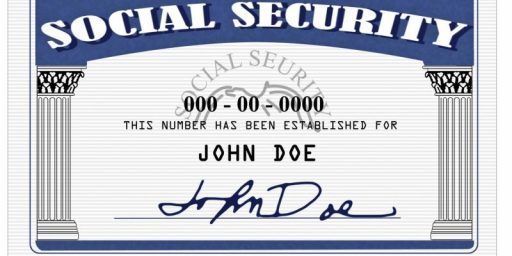Nearly 1/5th Of Congress Getting Both Pension And Salary
Doesn't pass the smell test.
According to a recent National Journal analysis, nearly 20% of Congress is collecting a government pension of some kind while also collecting their Congressional pay:
About 90 members from both chambers collected a government pension atop their taxpayer-financed $174,000 salary in 2012, National Journal found in an examination of recent financial records. Including a dozen newly elected freshmen who reported government pensions last year, the number now stands above 100. That’s nearly one-fifth of Congress. One lawmaker, freshman Rep. Joyce Beatty, D-Ohio, received $253,323 from her government pension last year—a sum that, combined with her congressional salary, will make her better paid than President Obama this year.
Congressional pensioners span the ideological spectrum, from tea-party conservatives who rail against government waste to unabashed liberals. They are among the richest members (Sen. Dianne Feinstein, D-Calif., with a net worth of at least $42.8 million in 2011) and the poorest (Sen. Debbie Stabenow, D-Mich., who reported between $15,000 and $50,000 in the bank and at least $600,000 in mortgage and loan debts). Overall, Democrats draw government pensions more often than Republicans—by a ratio of 2-to-1. Some lawmakers draw on multiple public retirement packages, including the No. 2 Republican in the Senate, John Cornyn of Texas, who collected $65,000 from three different pensions in 2012.
All told, current members of Congress pocketed more than $3.6 million in public retirement benefits in 2012, the investigation found. The actual figure is almost certainly even higher because disclosure is uneven. Some lawmakers reported retirement earnings in ranges; others listed pensions but no amounts at all. This analysis, which included historical data from the Center for Responsive Politics, also does not include most military retirements, because lawmakers are not required to report them (although those who voluntarily did so were included). Members who served last year but are gone now were not included; freshmen who reported collecting pensions as candidates in 2012, such as Beatty, were included.
And, of course, it’s all completely legal:
Many states and municipalities forbid the practice of retiring and then taking a full-time job within the same governmental system. But those rules don’t apply to members of Congress when they are drawing a federal paycheck and, typically, a state or local pension. “It’s a hard nut to crack as far as addressing it, because it’s different jurisdictions,” Ellis says. And federal lawmakers who have served before on the state level can garner gold-plated retirement benefits, because state legislators often write their own generous rules to allow earlier retirement or fatter pensions.
Take Democratic Sen. Mary Landrieu, 57, who has been collecting her Louisiana pension since late 1997, the year she joined the Senate. She was only 41. (Louisiana voters had passed a constitutional amendment to ban pensions for new state legislators in 1996, the year before. But Landrieu, who had spent eight years as a legislator, could withdraw hers because she was grandfathered in.) The average Louisiana state worker hired in recent years, by contrast, can’t retire with a full pension until age 60. Landrieu lists her annual pension payout as between $15,000 and $50,000. “They’re two different levels of government, and it’s completely permissible,” says Landrieu, who served two terms as state treasurer after her time as a state legislator. “I have every intention of maintaining it and continuing.”
Like Landrieu, most lawmakers collecting public pensions say they deserve the payout because they put in the time and contributed to their retirement from their own paychecks. “I’m just saying I worked hard 33 years,” says Rep. Dave Reichert, R-Wash., a former detective who helped hunt down the Green River serial killer and retired as King County sheriff. He earned a $109,101 pension in 2012—fourth highest in Congress. “Anyone who looks at a 33-year career and watches someone retire and says they don’t deserve that retirement, I would vigorously disagree with that.”
Rep. James Clyburn of South Carolina, the No. 3 House Democrat, accepted a $55,000 pension last year. “I spent over 30 years working in state government and receive a pension just as all other qualified state retirees do,” he said in a statement. Clyburn, the state’s former human-affairs commissioner, has collected roughly $1 million in pension benefits since joining Congress in 1993.
There seems to be little question that the pensions were earned and, since there’s no Federal Law on the matter, there’s nothing legally wrong with it. Technically, it is also true that a Member of Congress who is collecting a pension from a state or local level job isn’t technically double-dipping. Nonetheless, there’s an air about the whole thing that doesn’t pass the smell test and, as one commentator notes, it just tends to reinforce what the public already thinks of Congress:
Taxpayer groups and some conservatives have condemned the practice as “double-dipping”; they say elected officials shouldn’t simultaneously draw a public pension while cashing a government paycheck, because taxpayers ultimately foot at least part of the bill for both. “You’re paying them twice,” says Steve Ellis, vice president of Taxpayers for Common Sense.Fixed pensions are a fading memory for most American workers, who are still smarting from losses to their 401(k)s during the credit crisis—even if those accounts have since recovered. The fact that federal lawmakers can draw large retirement payments atop generous taxpayer-funded salaries only helps fuel the widespread sense that the ruling class in Washington puts its own interests first.
Many states and municipalities forbid the practice of retiring and then taking a full-time job within the same governmental system. But those rules don’t apply to members of Congress when they are drawing a federal paycheck and, typically, a state or local pension. “It’s a hard nut to crack as far as addressing it, because it’s different jurisdictions,” Ellis says. And federal lawmakers who have served before on the state level can garner gold-plated retirement benefits, because state legislators often write their own generous rules to allow earlier retirement or fatter pensions.
(…)
Pete Sepp, executive vice president of the National Taxpayers Union, says such packages can erode public trust in an institution where it’s already in short supply. “Retirement packages remain a concern for taxpayers because they naturally invite comparison to their own situations,” he says. And there aren’t many Americans earning a six-figure paycheck and a five- or six-figure pension.
Ultimately, there may be no way to address this issue. A blanket rule that Members of Congress cannot collect on rightfully-earned pensions while serving in Congress seems to be unlikely to pass and, if it did, it would likely be filled with so many exceptions for things such as military pensions that it would end up being meaningless. At the same time, though, one should note that it is possible for pensioners to delay accepting their pension, or to decline to accept it altogether if they should choose to. For example, among the legislators who are accepting pensions along with a Congressional salary are some of the richest members of Congress, such as Senator Dianne Feinstein and Connecticut Senator Richard Blumenthal. Without suffering much pain, they could easily follow the example of one New York Congressman:
Not every member of Congress who is eligible for a pension chooses to collect. Rep. Chris Gibson, R-N.Y., a retired Army colonel who won his seat in 2010, says he writes a check every month for his full military pension, minus taxes owed, to the U.S. Treasury. It was a decision he came to jointly with his wife. “The salary that we get as a congressman is very generous,” Gibson says. “We did not want to double-dip on the taxpayers in a time of fiscal challenge.”
The Gibsons aren’t rich by congressional standards. They hold no stocks, bonds, or mutual funds—only a single bank account with between $100,000 and $250,000. It earned less than $1,000 in interest last year. Still, he declined to judge his better-off colleagues who are collecting twice. “It’s a personal decision people have to make,” he says.
See? That’s not hard at all.
This is hardly the most serious problem in Washington, but it does demonstrate yet again the extent of the disconnect between the American people and those who purport to represent us. No wonder they’re doing such a horrible job at it.







I’m sure they do. Laughing all the way to the bank. Plus the great health care they all receive. The majority of them couldn’t care less that many other citizens don’t have health care as it’s a case of I’m alright Jack, who cares about anyone else? Then last but not the least they work for the GOVERNMENT! You know, the one they all rail against as being too big and how government must shrink by cutting government jobs. Just as long as it’s not their jobs being cut of course! Selfish and out of touch with the common man. It’s all about me, myself and I.
I have to say Doug, this is a practice that is hardly limited to those in Congress.
It is easy to demogogue so-called double dipping. Fact of the matter is that pensions are earned in one job. What job one gets after that is a totally separate transaction, whether one goes back into government or private industry or whereever. If you want to argue that legislators pension plans are too generous, go ahead and do that. Pensions are for services already rendered and earned.
BTW, our wonderful Governor Perry draws a Governors salary and a state of Texas pension. At least it prevents him from demogoging state employee pensions.
Also, military bases are full of people doing this.
Yeah, it’s hard for me to see this as a problem. In fact, it’s hard for me to see the dislike of this in a good light at all. They earned the pension, they should get it. They’re earning the salary (at least to the letter of the law if not in spirit), they should get it, too.
In the spirit of full disclosure, I get a pretty decent pension from the military (I retired as an O-6 after thirty years) and also work full-time; however, I’m an independent consultant, so I’m self-employed and don’t get a salary at all, much less from the Feds.
I don’t really care about the money they make…but it would be nice if they actually did something for it. 37 votes to repeal Obamacare? Seriously…
I’m more disturbed by the lawmakers who denigrate and demonize public employees for their pensions and health care while enjoying the same benefits themselves. I agree with all above who said that pensions are promised benefits earned at a job, usually in lieu of salary increases or other benefits. I don’t disagree with anyone collecting what was promised to them and earned.
I am not particularly bothered by earning and a felting pension payments while serving in congress.
I do object to legislative and other elected officials receiving pensions.
Some states have allowed teachers who have retired to return or stay in and draw salary and retirement. Most states have ended this because of budget shortfalls – beginning teachers are cheaper to pay than those who are at the top of the pay scale. However, they can and do cross over into a neighboring state and can get a teaching job, drawing both. Since they could not pay good salaries, to attract people with college degrees the states had to offer good benefits: retirement, health plans, sick days. Many states are now strapped for cash and are trying to cut these benefits to our educators : unfortunate. It may seem exorbitant for these congress members to do that, but it is legal and done in many areas of government.
Here in Texas, elected officials who were previously state employees can collect pensions from the Employee’s Retirement System for their time as a state employee *while* they are currently serving – and collecting their full salary for working as – an elected official, also from the Employee’s Retirement System.
The largest known beneficiary of this is Governor Rick Perry.
Even better, since we have a part time legislature that only meets every two years, a state legislator’s salary is $7,800 per year, plus travel and other allowances. After 8 years in the Lege, they can collect a full Elected Officials pension once they leave, which is based not on the $7,800, but rather on the salary of a State Judge (currently $125,000). So when they want to bump up their pensions, they just give the Judges a raise.
@Gromitt Gunn:
Why do I get the feeling that the judges are perfectly OK with that?
@beth: “I’m more disturbed by the lawmakers who denigrate and demonize public employees for their pensions and health care while enjoying the same benefits themselves.”
Same here; I have two Tea Party relatives who are pulling down government pensions and benefits, while being members of the Tea Party (i.e., working to make sure that anybody following them gets a worse deal).
Have you ever looked into the number of police and firemen – most of whom retire in their early to mid-50s – are receiving nice pensions and working too? Not uncommon at all.
@Scott:
Here in Brazil that´s definitively a problem. Not only that, there are public institutions that resembles nursing homes because people uses political connections to get a job when they are retired.
At least most of these members of Congress are collecting state and local government pensions which are mostly funded with actual assets, whereas social security and federal pensions are funded by nothing more than entries on spreadsheets.
Even better would be if members of our Congress would move to China and become legislators over there. 90% of Chinese legislators are millionaires, which is an even higher percentage than members of our Congress here, and they often have some oligarchy connection to some factory or large scale business interests that they own. – What started as some Maoist personality cult Communist Party dominated system has turned into an oligarchy of wealthy Communist Party members who are now the best capitalists in the whole world.